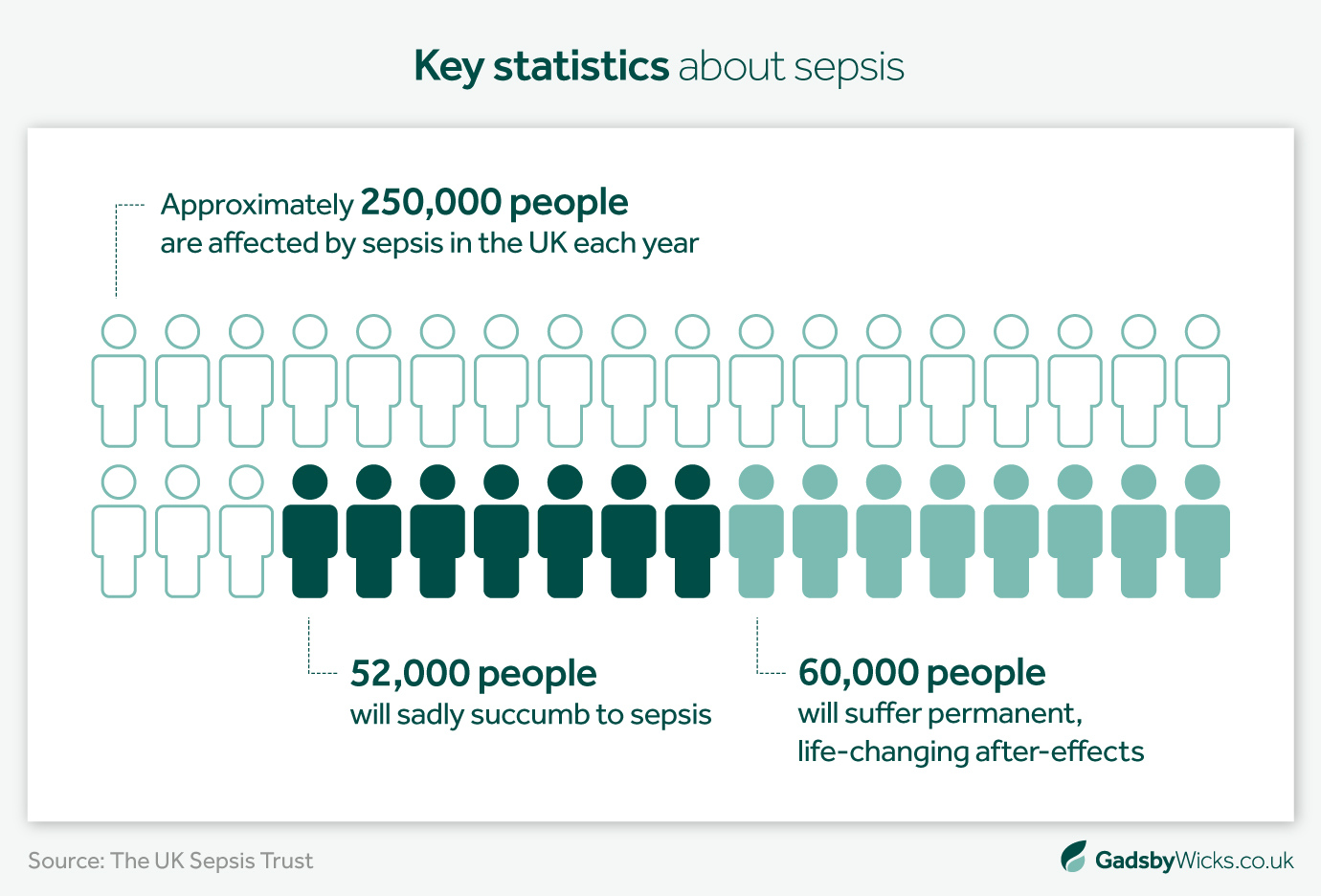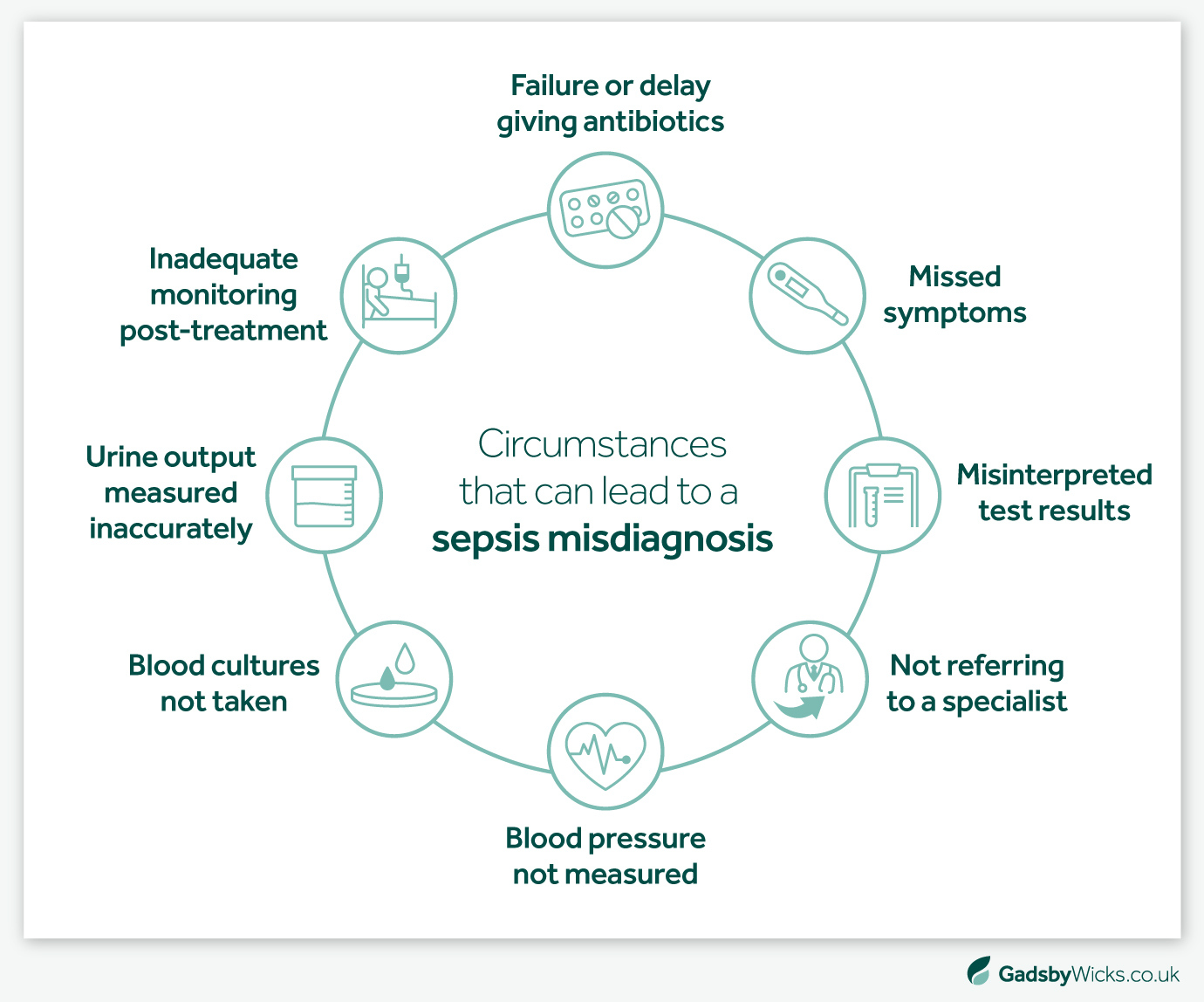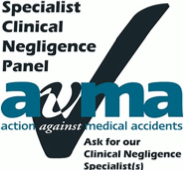- Home >
- Sepsis Claims
Any damage or death caused by sepsis is a tragedy. But learning earlier action could have been taken to minimise the harm you experienced or save a loved one’s life can make this experience even harder to come to terms with.
If you or someone you know was hurt because their doctor failed to recognise or act on the symptoms of sepsis, we can help you reach a settlement that secures your family’s future. With over 30 years of specialist experience and millions won in compensation, trust our compassionate solicitors to help you take your life back.

Do you have a sepsis negligence claim?
Sepsis can move from early stages to multiple organ failure in just a few hours. Sadly, that means an avoidable misdiagnosis or delayed treatment can have life-changing consequences for patients and their loved ones.
If your or a loved one’s symptoms were missed, or delays in providing antibiotics led to preventable harm, you may be entitled to make a sepsis negligence claim. With our specialist solicitors by your side, we can help you navigate the complexities of your case and achieve the justice you rightly deserve.

The specialist sepsis negligence claims solicitors for Essex & East Anglia
We know first-hand the immense impact sepsis negligence can have on patients and their loved ones. Our mission is to ensure those affected get justice, compensation and clarity.
Securing millions in compensation for our clients since 1993, we work hard to achieve the best outcome without adding to the difficulties you face. We investigate all evidence and negotiate with Defendants on your behalf, with 96% of our cases settled out of court. Plus, with our commitment to ‘no win, no fee’, you never have to pay a penny unless we win your claim.
What does our sepsis negligence claims process look like?

A free initial consultation
Call us, request a callback or complete our online form and we’ll assess if you have a valid medical negligence claim.

Funding your claim
Discover the ways we can fund your claim without you paying a penny at any stage of the process.

Investigating evidence
We gather medical records, witness statements and more to learn what happened to you and prove your claim.

Instructing independent medical experts
We work with impartial, experienced medical experts to establish whether your injuries were due to substandard medical care.

Valuing your claim
We assess your health and financial losses to accurately estimate how much compensation your claim is worth.

Presenting your case
We contact the Defendants and the Courts on your behalf to set out your allegations and receive a response.

Negotiating a settlement
We work to achieve a fair settlement for you outside the courtroom – this is how 96% of our cases end.

Preparing for Trial
If we must proceed to Trial, we fully prepare you for what to expect so you receive the right result in court.
FAQs about sepsis negligence claims
What is sepsis?
Sepsis, also known as septicaemia, is a potentially life-threatening case of blood poisoning, where the body’s response to an infection results in it attacking its tissues and organs.
This sends the body’s immune system into overdrive, causing a series of reactions. This includes widespread inflammation and a significant drop in blood pressure, cutting down the blood and oxygen supply to vital organs.
If not treated quickly, a person can suffer septic shock, rapidly leading to multiple organ failure and possibly even death.

What are examples of negligent sepsis treatment?
The window to diagnose and treat sepsis is often incredibly short. Someone can proceed from the early signs of sepsis to multiple organ failure in a matter of hours.
Early treatment of sepsis or septic shock with antibiotics and fluids gives patients a greater chance at survival and recovery, and prevention of long-term organ or limb damage. Unfortunately, sometimes the rapid nature of sepsis means that by the time someone arrives at a doctor or hospital, nothing can be done to prevent permanent damage or death.
However, an even more difficult situation to come to terms with is when there are opportunities to treat the condition early, but a healthcare professional fails to recognise the symptoms leading to a misdiagnosis or delayed diagnosis.
When this happens, the window to treat sepsis can quickly shut. By the time the condition is diagnosed and addressed, it may already be too late to prevent long-term organ damage and limb damage, or to save someone’s life.

Circumstances that can lead to a sepsis misdiagnosis include:
- Failure or delay in giving antibiotics
- Missed symptoms
- Misinterpreted test results
- Not referring to a specialist
- Blood pressure not measured
- Blood cultures not taken
- Urine output measured inaccurately
- Inadequate monitoring post-treatment
There are also circumstances known as ‘supervised neglect’. This is when a healthcare professional has a record tracking their patient’s deterioration and symptoms, but has done nothing to address this. If you are affected by these circumstances, you may have a valid sepsis negligence claim.
What are the consequences of sepsis negligence?
Due to the rapid progression of sepsis, a medical misdiagnosis, delayed diagnosis or delay in treatment can have life-changing outcomes for a patient and their loved ones.
If misdiagnosed, sepsis can lead to organ failure, which can affect someone for the remainder of their life. For example, permanent damage to the kidneys could result in lifelong dialysis treatment. The risk to vital organs such as the brain, heart and lungs increases the longer sepsis is untreated, which can lead to constant pain, the need for ongoing treatments and therapies, and shortened life expectancy.
Sepsis can also lead to tissue death or gangrene, which may require digits or limbs to be amputated to save someone’s life. The longer sepsis is left undiagnosed or untreated, the greater the risk that the affected person succumbs to the condition.
If you or someone you care about has faced any of these consequences due to the actions or inactions of your doctors, we can support you at every step of making a misdiagnosis claim or delayed treatment claim.
How do I prove I have a sepsis negligence claim?
To make a claim for sepsis that was misdiagnosed or mistreated, your solicitors will need to prove three key elements:
- A healthcare professional breached their duty of care towards you
- You suffered pain, injury, loss or damage
- Your suffering was a direct result of the professional’s breach of duty
As specialist medical negligence solicitors, we will assess all available evidence for your claim to establish what happened and the standard of treatment you or your loved one received. This will often include:
- Medical records
- Personal statements
- Witness statements
- Photographs
We will also speak to relevant, independent medical experts about the details of your case. Depending on what healthcare professional is considered liable for the misdiagnosis or substandard care – GP, doctor, nurse, paramedic, etc. – we will talk to an impartial expert working in the same role to determine whether their actions or inactions were reasonable based on the symptoms you or your loved one presented.
If they inform us that the treatment provided fell below a reasonable standard and was likely to have led to the consequences you suffered, this could be grounds to claim compensation.
How can compensation help following a sepsis negligence claim?
Compensation is designed to help you return to the position you would have been in had your condition been correctly diagnosed or, if this is not possible, support the changes this had on your lifestyle.
How much compensation you receive for a sepsis negligence claim will depend on the pain, suffering and loss of amenity you endured, and the extent of the impact the misdiagnosis or delayed treatment has had on your life.
Compensation can help cover a variety of costs, including:
- Adaptations to the home and vehicles
- Loss of earnings
- Future financial losses due to an inability to work or a need to change job
- Aids and equipment
- Ongoing treatments, therapies and medication
- Travel expenses
- Therapies or support for any psychological harm caused by the experience
- Paying for services the claimant cannot perform anymore, such as gardening
Beyond compensation, claiming for a sepsis misdiagnosis can secure answers to what happened to you or your loved one. This can help you gain closure and inspire initiatives that prevent what happened to you from happening to someone else in the future.
What if negligent sepsis treatment leads to a patient’s death?
Sadly, death is a real possibility if a misdiagnosis delays someone from receiving treatment for sepsis. In these circumstances, it is still possible for the family and dependants to make a medical negligence claim on behalf of the deceased.
Someone can bring a claim following the death of the claimant if:
- They are named as beneficiaries of the deceased’s estate in a Will or entitled to a share of the estate under intestacy law
- They qualify for the bereavement award under The Fatal Accidents Act 1976
- They were dependent on the deceased either financially or for services that the deceased provided to them (or had a reasonable expectation they would become dependent in future)
You can learn more about how to approach a claim of this nature in our article ‘Death by medical negligence – how to make a claim’. In sensitive circumstances such as these, our experienced lawyers will work closely with a claimant’s family and loved ones to establish whether a claim can succeed.
Contact our expert sepsis negligence claims solicitors
If you or a loved one has suffered as a result of a sepsis misdiagnosis, speak to someone about your options. Our team is here to listen and advise you on your next steps.

Lexcel accredited medical negligence claims solicitors
We are proud to be a Lexcel-accredited practice. The accreditation is a mark of quality and comes directly from the Law Society.
A recent assessment described us as a “Centre of Excellence” and we continue to operate to the highest standards across all main areas of our field. These include client care, case management, financial management, structure and strategy, people management, risk management, information management and file management.




Industry Recognised

